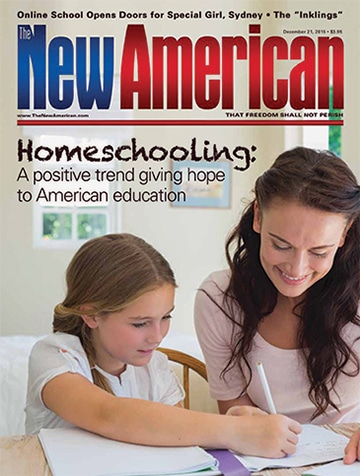Homeschooling Offers Hope
I was homeschooled from the 1st through 12th grades and never once desired to go to the government schools. At the time, I couldn’t imagine being confined to what looked like a prison system — bells telling me where to go, cutting short the time I wanted to spend on certain subjects; standing in line to have food dumped on a tray for me to eat; wearing the same clothes as everyone else; and truant officers hunting me down if I went rogue! None of that appealed to me. I was very happy with the freedom that homeschooling provided. Not only was I able to spend as much time as I needed on a subject, but I wasn’t forced to wait for others once I mastered it. This allowed me time to spend on things I enjoyed, such as reading history books or being involved in extracurricular activities.
— Eric
Some people think homeschoolers are sheltered — that their parents homeschooled them in order to protect them from the “evil influences of the world.” If that was indeed my parents’ goal, they failed; but, somehow, I don’t believe that was at all my parents’ intention. Far from being sheltered and unable to adapt to an unsheltered college life, being homeschooled gave me the skills and understanding I needed to interact successfully with the variety of people with whom I come into contact daily and for the classes I am now taking.... I’ve never once regretted being homeschooled. In fact, I think I may now have more pride in my home education than ever. And while I will be the first to admit that homeschooling isn’t for everyone, I am sincerely grateful to my parents for making the sacrifices they did to give me a unique education that has prepared me well, not only for college, but for life beyond the educational environment.
— Abigail Teske
Pride and emotions ran high … as our two daughters graduated from college. Our older daughter graduated magna cum laude from San Diego State University. Our younger daughter … graduated summa cum laude and was the valedictorian at West Valley College.
Both were homeschooled from kindergarten until they entered college.... They learned to love learning, how to solve problems, and how to think and study on their own. They learned good work ethics and how to be accountable — all essentials for success. There are also things that they did not learn about firsthand. They were not confronted with gangs, drugs, sex, smoking, vulgarity, disrespect, and broken homes. They know what these things are, but they were not hounded or distracted by such things on a daily basis. In short, the foundations set in the homeschooling environment provide so much more than just the three R’s. Homeschooling brings families together for several hours every day, allowing learning to go far beyond simple test scores. Family learning touches the fiber of one’s being and molds the fabric of one’s constitution, for both the student and the teacher!
— John and Vera
Homeschooling gave us the benefit of being in a home setting with our teachers as our loving parents. We developed self-motivation and self-discipline as we studied on our own (finishing our first college semester with the surprise blessing of almost a 4.0 each!). Most importantly, being around our parents equipped us with their values and spiritual goals, accompanied by a deep sense of family love and commitment.
— Taryn and Mirren
By requiring independent, analytical modes of thought, home instruction laid the foundation for my success at college in a manner that public schools cannot duplicate.... Rather than relying on a lecturer to introduce and clarify the material in the textbooks, I had to understand ideas, events, and data on my own, turning to my mom if all else failed. That forced me to think for myself and to exert myself, since I wasn’t being spoon-fed the material. As a result, I was well prepared for college, which follows the homeschool model of independent learning more closely than the public school model. Indeed, from my observations at college, what separates the top students from the rest of the pack is usually not intelligence but more often a diligent work ethic and good thinking habits. Homeschooling inculcated those skills in me.
— Alex
The above quotes, which can be found in their entirety along with many others on the website of the Home School Legal Defense Association (HSLDA), hslda.org, serve as a poignant testimony to the success and cultural impact of homeschooling in 21st-century America.
The deteriorating state of American academics, particularly manifest in K-12 public schooling, has led to a sense of frustration and hopelessness among parents and students alike. How do we know this? One only needs to look at the number of parents pulling their children out of the government school system, a number that grows every year, in favor of private schooling or homeschooling.
How It Began
Modern homeschooling began as somewhat of a countercultural movement. During the ’60s and ’70s, educational reformers and authors began questioning the methods and results of the government school system. Pioneers in the modern homeschool movement included John Holt and Raymond Moore. Holt was a professional educator from Massachusetts who began to seriously criticize the public education system in the 1960s with the publication of his book How Children Fail. He broke with the established public education system in 1977 when he felt that true reform was impossible. Holt died in 1985, but his ideas of “unschooling,” or education without any formal structure or coursework, are still very popular, especially in the northeastern region of the United States.
JBS Member or ShopJBS.org Customer?
Sign in with your ShopJBS.org account username and password or use that login to subscribe.

 Subscribe Now
Subscribe Now
- 24 Issues Per Year
- Digital Edition Access
- Exclusive Subscriber Content
- Audio provided for all articles
- Unlimited access to past issues
- Cancel anytime.
- Renews automatically

 Subscribe Now
Subscribe Now
- 24 Issues Per Year
- Print edition delivery (USA)
*Available Outside USA - Digital Edition Access
- Exclusive Subscriber Content
- Audio provided for all articles
- Unlimited access to past issues
- Cancel anytime.
- Renews automatically


